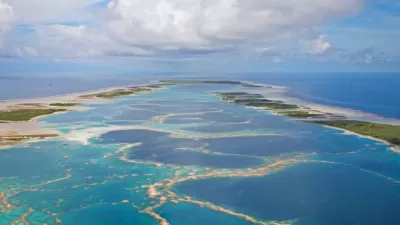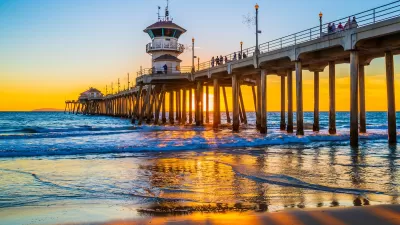Sea levels are declining near Juneau, Alaska, as a result of melting glaciers. Though it may seem a good sign in the face of climate change, the expanding earth is causing some major environmental concerns.
"The geology is complex, but it boils down to this: Relieved of billions of tons of glacial weight, the land has risen much as a cushion regains its shape after someone gets up from a couch. The land is ascending so fast that the rising seas - a ubiquitous byproduct of global warming - cannot keep pace. As a result, the relative sea level is falling, at a rate "among the highest ever recorded," according to a 2007 report by a panel of experts convened by Mayor Bruce Botelho of Juneau.
Greenland and a few other places have experienced similar effects from widespread glacial melting that began more than 200 years ago, geologists say. But, they say, the effects are more noticeable in and near Juneau, where most glaciers are retreating 30 feet a year or more.
As a result, the region faces unusual environmental challenges. As the sea level falls relative to the land, water tables fall, too, and streams and wetlands dry out. Land is emerging from the water to replace the lost wetlands, shifting property boundaries and causing people to argue about who owns the acreage and how it should be used. And meltwater carries the sediment scoured long ago by the glaciers to the coast, where it clouds the water and silts up once-navigable channels."
FULL STORY: As Alaska Glaciers Melt, It’s Land That’s Rising

Planetizen Federal Action Tracker
A weekly monitor of how Trump’s orders and actions are impacting planners and planning in America.

Maui's Vacation Rental Debate Turns Ugly
Verbal attacks, misinformation campaigns and fistfights plague a high-stakes debate to convert thousands of vacation rentals into long-term housing.

San Francisco Suspends Traffic Calming Amidst Record Deaths
Citing “a challenging fiscal landscape,” the city will cease the program on the heels of 42 traffic deaths, including 24 pedestrians.

Trump Prompts Restructuring of Transportation Research Board in “Unprecedented Overreach”
The TRB has eliminated more than half of its committees including those focused on climate, equity, and cities.

Amtrak Rolls Out New Orleans to Alabama “Mardi Gras” Train
The new service will operate morning and evening departures between Mobile and New Orleans.

The Subversive Car-Free Guide to Trump's Great American Road Trip
Car-free ways to access Chicagoland’s best tourist attractions.
Urban Design for Planners 1: Software Tools
This six-course series explores essential urban design concepts using open source software and equips planners with the tools they need to participate fully in the urban design process.
Planning for Universal Design
Learn the tools for implementing Universal Design in planning regulations.
Heyer Gruel & Associates PA
JM Goldson LLC
Custer County Colorado
City of Camden Redevelopment Agency
City of Astoria
Transportation Research & Education Center (TREC) at Portland State University
Jefferson Parish Government
Camden Redevelopment Agency
City of Claremont





























